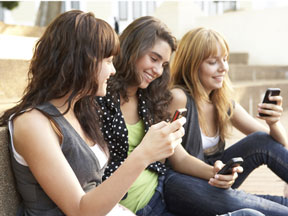A University of Alabama at Birmingham study found adolescents ages 14-15 are engaged in media more than 23 total hours daily.
 “It’s just crazy,” says Aaron Davis, doctoral candidate in the Department of Psychology and author of the poster. “I knew that media use was significant in their lives but I didn’t realize how consuming it was for them and that is concerning especially when you consider all they have access to online.”
“It’s just crazy,” says Aaron Davis, doctoral candidate in the Department of Psychology and author of the poster. “I knew that media use was significant in their lives but I didn’t realize how consuming it was for them and that is concerning especially when you consider all they have access to online.”
The study, part of a larger study on adolescents and sleep deprivation, surveyed 55 Birmingham area adolescents and their parents regarding media use. Fifty-eight percent of the teens were female, and 53 percent were African-American. The adolescents were an average age of 14.89 years. The media hours were calculated independently so if they were talking on the cell phone for one hour while simultaneously watching television that counted as two hours.
The survey found that on average each day teens spent more than six hours texting, three hours watching television, one and a half hours on Facebook, one hour on Twitter, one and a half hours on other Internet sites and one hour playing video games. Parents also were asked to estimate how much time their teens spent using media each day, and their answers differed from their children’s by more than six hours.
“Aaron's results may surprise a lot of people,” says David Schwebel, Ph.D., co-author and director of the UAB Youth Safety Lab. “Teens these days enjoy the wonderful benefits of technology for communication, entertainment, and learning but we also have to figure out ways to set limits on teens' overuse of technology. Much as it can be difficult sometimes, parents have to stay involved and monitor their adolescents' use of technology. We have to work together to be sure teens use technology safely, get adequate sleep at night and do not use technology in while driving or in situations where their attention should be elsewhere, such as in a classroom.”
The study also examined the way media use affects sleep. Nine of 10 said they have at least two media sources in their bedroom; more than one-third said they have four or more media sources in their bedroom. The UAB study also found that 35 percent of students were awakened by their cell phone at least once nightly. Parents are encouraged to set rules for their adolescents’ media use that include powering off cell phones at night and limiting screen time during the day. It is also recommended that parents know where their kids travel online and who they visit when texting, IMing and chatting.
“Kids are getting cell phones at younger ages, and the phones give them access to anything they want — games, videos, Internet and friends — anytime they want it,” says Davis. “I’m not sure what the future will bring but I do know this is an area we need to pay significant attention to with research and parenting. It is really important to know how this is affecting our kids.”
Davis’ work is supported by grants from the National Science Foundation and The Children’s Hospital of Philadelphia.
